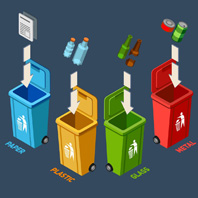EBRD, EU and Tbilisi municipality boost cooperation on solid waste management
Tuesday, December 24


The document will build on the National Waste Management Strategy prepared with the support of the European Union (EU) and adopted in 2016. It will guide the City in its efforts to recycle and separate waste in the municipality.
The Tbilisi Municipal Solid Waste Strategy will focus on waste prevention, recyclable separation, compliance with the EU requirements and other international and national regulations, along with vision and methodology to implement and monitor.
The grant is provided by the EU’s Municipal Project Support Facility (MPSF). This technical assistance is a part of the EBRD’s broader initiative - Green Cities and specifically Tbilisi Solid Waste Project - a ˆ15 million EBRD loan to Georgia, on-lent to Tbilisi City for the benefit of Tbilservice Group Ltd. - a municipal company responsible for solid and construction waste management and street lightning.
With the loan from the EBRD, the city will renew the solid waste collection fleet; upgrade existing solid waste transfer station and improve leachate system at the solid waste landfill of Tbilisi. The project also foresees fostering stakeholder engagement and public awareness on solid waste management.
“We are very pleased to be signing this grant agreement today and want to thank our long-standing partner EU for contributing to this project. The challenge of waste management affects every person and requires a collective, comprehensive approach. We are happy to provide lending to upgrade infrastructure, but also Technical Cooperation, such as supporting Tbilisi to develop municipal solid waste strategy – to ensure a basis for a healthy, safe and secure environment for the citizens of Tbilisi,” said Catarina Bjorlin Hansen, EBRD Regional Director for the Caucasus.
“We are very happy that through this new action, the Municipality of Tbilisi will benefit of a new Municipal Solid Waste strategy and will be able to make relevant investments in the waste sector. This will help to better protect the environment, the health of citizens and contribute to further improving the quality of life of inhabitants,” said Catalin Gherman, Deputy Head of Cooperation in the EU Delegation.
This is the fifth signed solid waste management project financed by the EBRD in Georgia.
The EBRD is a leading institutional investor in Georgia. Since the start of its operations in the country, the Bank has invested over ˆ3.6 billion in 239 projects in the financial, corporate, infrastructure and energy sectors, with 87 per cent of these investments in the private sector. (Delegation of the European Union to Georgia)
